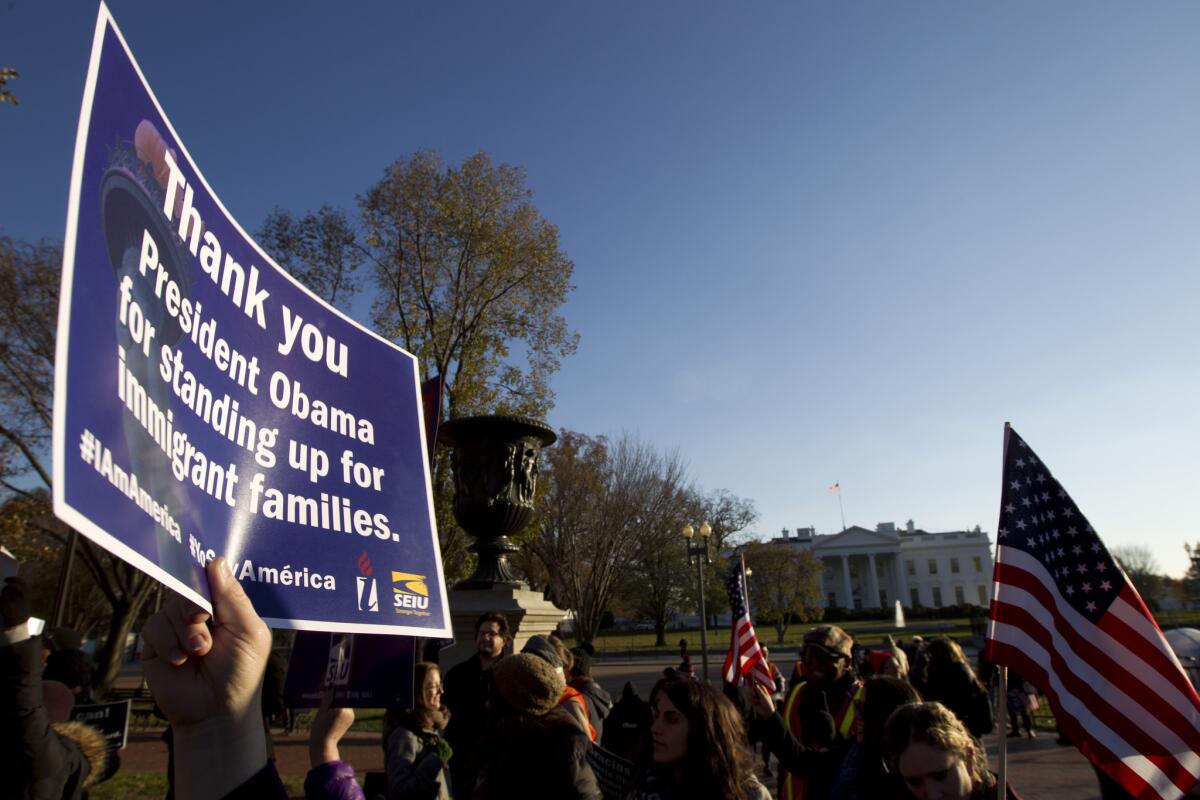Obama defends legal reasoning behind his new immigration plan

- Share via
Reporting from Washington — President Obama argued Sunday that his plan to suspend enforcement of U.S. immigration law for certain violators won’t clear the path for a future Republican president to take similar executive actions regarding tax laws he or she doesn’t like.
In an interview on the Sunday show “This Week,” ABC’s George Stephanopoulos asked the Democratic president whether one of his successors, unable to get Congress to cut taxes, could simply opt to look the other way if wealthy people decided not to pay a percentage of their capital gains tax.
“Absolutely not,” Obama said. “What is true today is we don’t audit every single person, but we still expect that people are going to go ahead and follow the law.”
In a world of limited resources, the president said, the federal government has to “make sure that we prioritize those folks who are most dangerous and we should acknowledge what everybody has already acknowledged through their actions – and Congress acknowledges through their budget – which is we’re not in the business of deporting millions of people or breaking up families.”
The same question is popping up in different iterations for Obama in the days since he announced his legal reasoning for a new set of priorities to enforce immigration law. His plan could defer the deportation of more than 4 million immigrants in the country illegally and benefit up to 1 million more.
Some people living in the country illegally can qualify for a reprieve from deportation, he said, because they are taking care of their families and don’t pose a danger to society.
He has the right of “prosecutorial discretion” to enforce the law, similar to the way prosecutors exercise it every day to decide which sort of crimes to focus on.
Republican lawmakers complain that Obama is unilaterally ordering changes that Congress has declined to pass into law.
It’s a “stunning and sad display by the president,” Texas Sen. Ted Cruz, a Republican, told “Fox News Sunday.” “We need to impose real consequences.”
Cruz said the Congress should block everything the president tries to do, except those of “vital, national” importance.
If GOP leaders settle on that strategy, it could mean a permanent stall on presidential nominees for judgeships and top administration posts for the next two years.
Anticipating that possibility, Obama is already arguing that the American people don’t want to see that kind of dysfunction in their government.
While golfing with friends outside Las Vegas over the weekend, Obama was preparing to launch a sales tour of sorts around the country to explain what he is trying to do and why.
In his interview with Stephanopoulos, taped in Nevada, Obama previewed his argument against gridlock.
“Ted Cruz says that now Republicans should block every nomination going forward,” Stephanopoulos asked. “Your friend Sen. Tom Coburn (of Oklahoma), is wondering about possible violence. What do you think about those reactions?”
“There’s often a lot of rhetoric coming out of Congress, and in Washington,” Obama answered. “But it doesn’t match up to what I think the American people expect. What the American people expect is that if we disagree on one thing, then we disagree on that thing.
“And then,” he added, “we work on everything else.”
For news about President Obama and the Obama administration, follow me on Twitter: @cparsons
More to Read
Sign up for Essential California
The most important California stories and recommendations in your inbox every morning.
You may occasionally receive promotional content from the Los Angeles Times.











